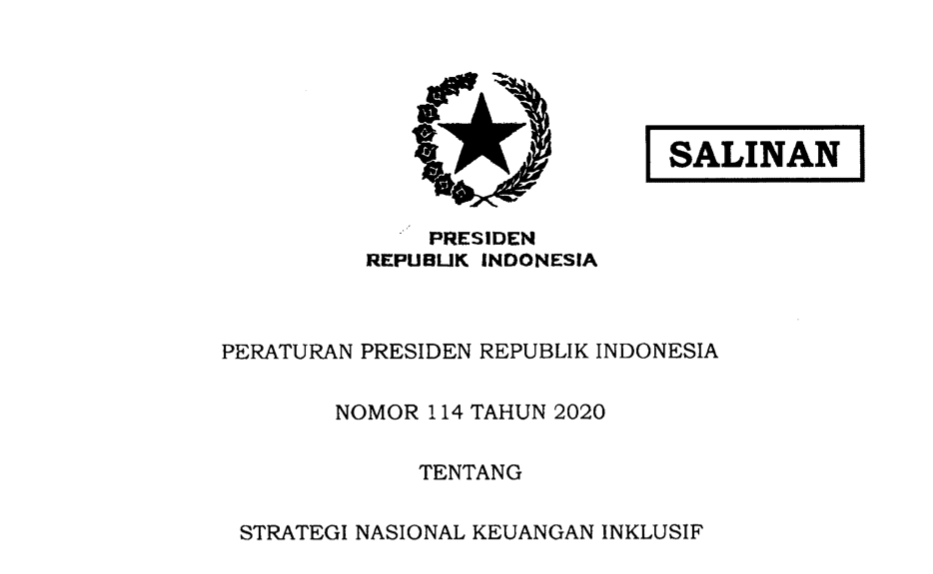Gov’t Issues Regulation on National Strategy for Financial Inclusion

In a bid to improve people’s welfare through continued efforts to achieve financial inclusion, President Joko “Jokowi” Widodo on 7 December signed Presidential Regulation Number 114 of 2020 on the National Strategy for Financial Inclusion.
The issuance of Presidential Regulation is aimed at supporting the achievement of financial inclusion which requires synergy between national, regional, inter-ministerial / institutional development planning and related Sustainable Development Goals (SDGs).
“The National Strategy for Financial Inclusion (SNKI) is a national strategy that contains objectives, ways of achieving goals, targets and targets for financial inclusion to encourage economic growth, speed up poverty reduction, and reduce inequality between individuals and regions so as to realize the welfare of the Indonesian people,” reads Article 1 of the Regulation.
The SNKI comprises Preliminary, the Indonesian Financial Services, Inclusive Financial Policy, and Closing stated in the attachment which is an integral part of this Presidential Regulation.
Under Article 2, the SNKI has functions as guidelines for ministries / institutions that are members of the National Financial Inclusion Council (DNKI) in formulating sectoral policies related to financial inclusion as outlined in strategic planning documents in their respective areas of duty, a means to synergize the National Medium Term Development Plan (RPJMN), the Regional Medium Term Development Plan (RPJMD), the Government Work Plan (RKP), the Local Government Work Plan (RKPD), and related SDGs in Indonesia, and materials for the preparation and adjustment of regional policies by taking into account the duties and functions of the Regional Government in achieving the national targets contained in the SNKI.
To implement the SNKI, the DNKI is established and has duties of coordinating and synchronizing the implementation of SNKI, providing directions, steps, and policies for solving problems and obstacles in implementing SNKI, and monitoring and evaluating the implementation of SNKI, reads Article 4 paragraph (2).
Article 4 paragraph (3) stated that the DNKI is chaired by the President and comprises ministers and heads of related institutions, while Governor of central bank Bank Indonesia and Head of the Board of Commissioners of the Financial Services Authority serve as Deputy Implementing Chair.
“The position of Governor of Bank Indonesia and Head of the Board of Commissioners of the Financial Services Authority as referred to in paragraph (3) shall not reduce the authority and independence of the implementation of their respective duties and functions based on the provisions of laws and regulations,” reads Article 4 paragraph (7).
In carrying out its duties, the DNKI may involve ministries, institutions, local governments, business entities and stakeholders. The DKNI is also assisted by the Working Group and the Secretariat.
“In the context of sharpening the implementation of SNKI in the regions, the DNKI may involve teams in the regions,” read the provisions of Article 7.
Article 11 reads that all costs required in carrying out the duties of DNKI, the Working Group and the Secretariat are borne by the State Budget (APBN) of Coordinating Ministry for Economic Affairs and / or other legal sources of funding in accordance with the provisions of laws and regulations.
This Presidential Regulation shall apply from the date of its promulgation and is promulgated by Minister of Law and Human Rights Yasonna H. Laoly on 7 December 2020.
“With this Presidential Regulation coming into force, Presidential Regulation Number 82 of 2016 on the National Strategy for Financial Inclusion (State Gazette of the Republic of Indonesia Year 2016 Number 185) shall be revoked and declared invalid,” reads Article 12 of this Regulation. (UN) (MUR/EP)








